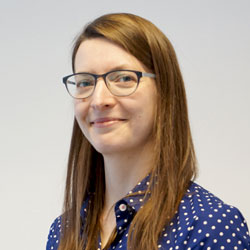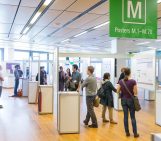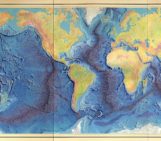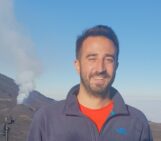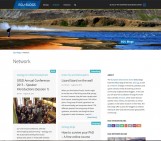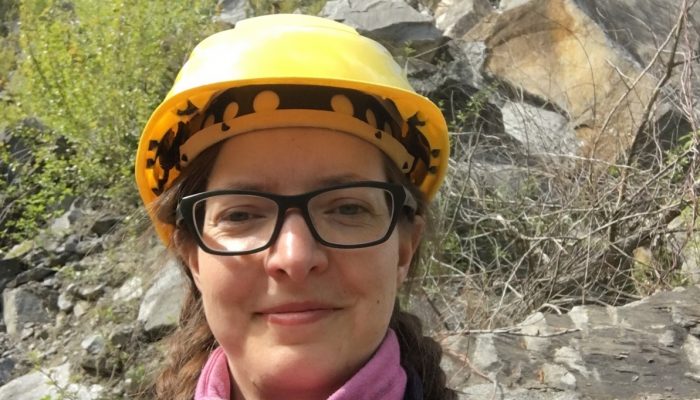
In addition to the usual GeoTalk interviews, where we highlight the work and achievements of early career researchers, this month we’ll also introduce one of the Division early career scientist representatives (ECS). They are responsible for ensuring that the voice of EGU ECS membership is heard. From organising short courses during the General Assembly, through to running and attending regular ECS representative meetings, their tasks in this role are varied. Their role is entirely voluntary and they are all active members of their research community, so we’ll also be touching on their scientific work during the interview.
Today we are talking to Stephanie Zihms, ECS representative for the Earth Magnetism & Rock Physics (EMRP) Division and the incoming Union-level ECS representative. Interested in getting involved with EGU and its activities for early career scientists? Consider applying for one of the vacant representative positions.
Before we get stuck in, could you introduce yourself and tell us a little more about yourself and your career?
Where to start, I’m originally from Germany but moved to the UK in 2005 for an year and ended up staying. I have had a varied career and would probably call myself a multidisciplinary geoscientist.
After graduating with a bachelor’s degree in Earth Science from the University of Glasgow (2007), I worked for a geotechnical drilling company in Scotland as a geologist. However, I still had a drive to further my education, so following the economic downturn in 2008-2009, I started my PhD in Civil & Environmental Engineering from University of Strathclyde. After my PhD, I left academia again to work for the British Geological Survey, where for 14 months I studied the impact of heat on bentonite for radioactive waste disposal. This wasn’t quite the right fit for me, and I left to go back to academia for a postdoc.
In January 2015 I joined Heriot-Watt University, originally for a postdoc position looking at CO2 bubble behaviour in flow conditions (definitely a ‘tide me over’ position). After 4 months I joined the Institute of Petroleum Engineering for a geomechanics postdoc – finally working with rocks again. Now I have a postdoc in the Heriot-Watt University Lyell Centre studying fracture flow. This postdoc is great since it combines my experience from my previous postdoc and my time at the British Geological Survey.
Outside of work I love running, and I am currently training for a half marathon. I started running again after I was diagnosed with multiple sclerosis to better manage my mental health and increase my overall fitness.
Although we touch upon it in the introduction of this post: could you tell us what your role as ECS representative has involved and explain your new role as the Union-level ECS representative?
I was the first ECS representative for the EMRP Division and was kind of thrown in the deep end, but it was great to have some freedom to shape the role within the division. The biggest part is being the link between the division president and officers and the ECS community. I attend online meetings where all the ECS representatives exchange ideas, discuss issues and find solutions or support. For EMRP, I set up the division Twitter account and recruited some other ECS to help me run a Facebook page. Most divisions have a small team, which is a great way to get involved. At the 2017 General Assembly I organised an ECS dinner (open to all EMRP scientists) which went really well with over 40 scientists attending. We are planning to host a similar event at this year’s General Assembly.
As the Union-level ECS representative, I will be the link between the Union and the ECS via the division representatives. This is a very important role since it will be my job to represent the work the ECS representatives have done and present any changes the ECS representatives would like to see. Of course, I will have help from the new incoming Union-level representative Raffaele Albano, the EGU Outreach Committee, and you as the communication officer*.
I’m looking forward to working with you! So, why did you put yourself forward for these positions?
I volunteered for both roles because I think it’s important for ECS to have a say, get involved and have proper representation. We are the future of research and our voice should be counted. I am a big believer in peer-support and the ECS representatives provide this in a very positive way. It is also a great opportunity to get to know the insides of the EGU better and how it is all organised.
What can your ECS division members expect from the Earth Magnetism & Rock Physics Division in the 2018 General Assembly?
For the 2018 General Assembly we are planning an ECS dinner again (check your emails or our Facebook page for more information and updates). We will have representatives at the ECS Corner at the ice-breaker on Sunday evening, and I hope EMRP ECS will stop by to say ‘Hi!’ In addition to the official ‘Meet EGU’ booth with our division president, I’m planning a Meet & Greet in the ECS Lounge as well to provide another opportunity for ECS to introduce themselves, ask questions or get advice.
We are not planning any EMRP specific short courses this year but would be happy to help organise some for 2019. The short course programme at the EGU General Assembly is always great, and I highly encourage everyone to have a look at what’s offered.
Our division ECS team has four members, with one stepping up as the next EMRP division ECS representative. If anyone is interested in helping out but not sure about becoming a representative, consider joining your division ECS team. They will be grateful for the support.
What is your vision for the EGU ECS community and what do you hope to achieve as Union-level ECS representative in the time you hold the position?
I would like to see the ECS community more involved in organising sessions and shaping what the General Assembly looks like. We are running a short course on this year to accomplish these goals. I would also like to develop ways in which the ECS community could acknowledge established scientists that support ECS activities, but I would be interested in discussing just how to achieve this with the division ECS representatives.
How can those wanting to, get involved with the EGU?
There are lots of ways to get involved!
- See if your division is looking for an ECS representative and apply
- If the ECS representative position is taken, or if you’d rather not take on that role, ask if you can join the ECS team
- Fill in the surveys – this feedback is vital for us
- Attend the General Assembly ECS Forum (Thursday, 12 April at 12:15) and provide feedback
- Talk to your division ECS representative – either at one of the ECS events (ice-breaker, Networking & Careers Reception, Meet EGU) or you can shoot them an email
Interview by Olivia Trani, EGU Communications Officer
* The EGU communications officer is the ECS contact point at the EGU office.

